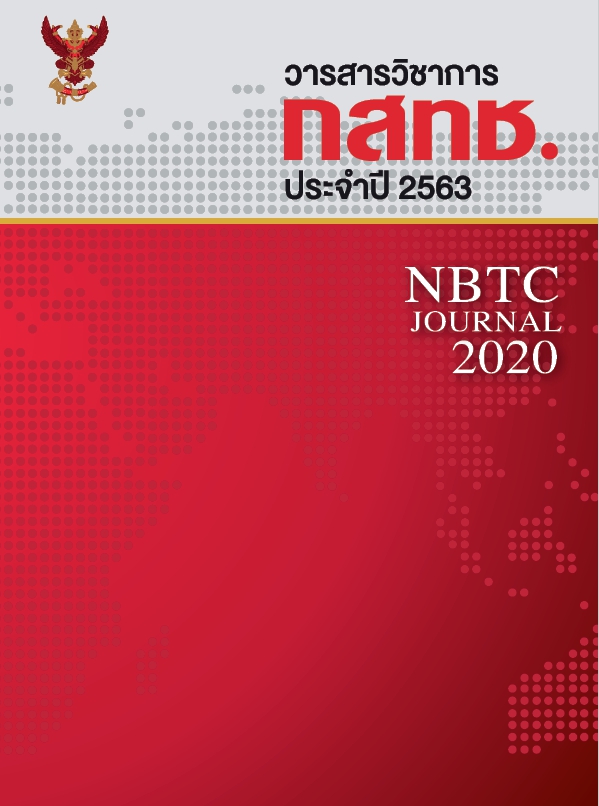The South Korea export policy on cultural contents
Keywords:
Content, Korean Wave, Cultural Contents, Hallyu Culture IndustryAbstract
Republic of South Korea announced the soft power policy about “Cultural Content”, that Korean language called “Hallyu” (Korean Wave). This policy is matter for oversea expansion to strengthen the cultural content ecosystem, which government directly supported the content industry and indirect support their economic system. This paper aims to study the Korea Policy oversea expansion of Hallyu and impact from this policy interm of succession, economic value and growing trends. This study is documentary research that reviews the literature on the subject for designing the policy to suggest future directions and new perspective for Thailand policy. This paper was found that South Korea succeeds from their policy. This successful has boosted their economic growth, which specific for many industries continue growing for example electronic, fashion, cosmetic, medicine, tourism, and other. The suggestion for Thai government, there should be set the policy to promote the production and expansions of cultural content, which Thailand have more a unique identity and traditional culture. This policy could be communicated Thailand products and services. The regulator such as The National Broadcasting Telecommunication Commission (NBTC) should publish the strategy to support the high quality content production and oversea expansion by using the new chance from new media landscape.
References
กมลเนตร สุวรรณาพิสิทธิ์ และเมตตา วิวัฒนานุกูล. (2553). นักร้องเกาหลีและกระแสนิยมเกาหลีของกลุ่มแฟนคลับชาวไทย. Journal of Communication Arts, 28 (2), 108-119. สืบค้นจาก https://www.tcithaijo.org/index.php/jcomm
/article/view/86352/68526.
กระทรวงวัฒนธรรม. (2559, สิงหาคม 2). วธ. ขานรับนโยบายประเทศไทย 4.0 – จัดประชุมสัมมนาติวเข้ม-ขับเคลื่อนงานด้านมิติวัฒนธรรม. [บล็อก] สืบค้นเมื่อ 20 พฤษภาคม 2563, จาก https://www.m-culture.go.th/mculture_th60/ewt_news.php?nid=5665&filename=index.
กระทรวงวัฒนธรรม. (2560). ยุทธศาสตร์การส่งเสริมอุตสาหกรรมภาพยนตร์และวีดิทัศน์ ระยะที่ 3 (พ.ศ. 2560–2564). [บล็อก] สืบค้นเมื่อ 21 พฤษภาคม 2563, จาก https://www.m-culture.go.th/mculture_th60/download/article/
article_20161130090947.pdf.
กระทรวงวัฒนธรรม. (2562). วิสัยทัศน์ พันธกิจ และยุทธศาสตร์. [บล็อก] สืบค้นเมื่อ 24 เมษายน 2562, จาก https://www.m-culture.go.th/th/article_view.php?nid=1545.
กรุงเทพธุรกิจ. (2558, ตุลาคม 10). ละครไทยในอาเซียน. [บล็อก] สืบค้นเมื่อ 11 เมษายน 2562, จาก http://www.bangkokbiznews.com/blog/detail/636221.
กิตติ ประเสริฐสุข. (2561). Soft Power ของเกาหลีใต้: จุดแข็งและข้อจำกัด. International Journal of East Asian Studies,
(1), 122-139. สืบค้นจาก https://www.tci-thaijo.org/index.php/easttu/article/download/144286/106774/.
ข่าวสด. (2561, กุมภาพันธ์ 21). ปี 60 คนไทยขนเงินเที่ยวเมืองนอก 2.76 แสนล้านบาท ญี่ปุ่นยังคงครองแชมป์. [บล็อก]
สืบค้นเมื่อ 8 มีนาคม 2562, จาก https://www.khaosod.co.th/economics/news_764912.
เขมิกา ทองประพันธ์. (2552). ปัจจัยที่มีผลต่อการตัดสินใจซื้อเครื่องสำอางนำเข้าจากสาธารณรัฐเกาหลีของผู้หญิงในเขตกรุงเทพมหานคร. (วิทยานิพนธ์ปริญญาเศรษฐศาสตร์มหาบัณฑิต) มหาวิทยาลัยธรรมศาสตร์.
จันทิรา สมบุญเกิด. (2552). แนวโน้มภาพยนตร์ไทยเพื่อการส่งออกสู่ต่างประเทศกรณีศึกษาเทศกาลภาพยนตร์นานาชาติปูซาน. (วิทยานิพนธ์ศิลปศาสตร์มหาบัณฑิต) วิทยาลัยนวัตกรรม มหาวิทยาลัยธรรมศาสตร์.
จิตสุภา ฤทธิผลิน. (2562). กลยุทธ์ของผู้นำบริการ OTT : โอกาสและความท้าทายของผู้ผลิตเนื้อหาไทย. [บล็อก] สืบค้นเมื่อ 27 เมษายน 2563, จาก https://broadcast.nbtc.go.th/bcj/2562/doc/2562_11_2.pdf.
เดลินิวส์. (2561, ตุลาคม 10). "Viu"เซ็นสัญญากับ"JTBC" จัดเต็มสุดยอดซีรีส์เกาหลี. [บล็อก] สืบค้นเมื่อ 4 มีนาคม 2562, จากhttps://www.dailynews.co.th/it/627461.
ประชาชาติธุรกิจ. (2562, เมษายน 3). กรมเจรจาฯ เผยผลจากความตกลงการค้าเสรีอาเซียน-เกาหลี ที่เริ่มมีผลใช้บังคับตั้งแต่ปี 2553 ทำให้การค้าไทย-เกาหลีใต้ขยายตัวกว่าร้อยละ 17.9 [บล็อก] สืบค้นเมื่อ 27 เมษายน 2563, จาก https://www.prachachat.net/economy/news-310835.
ปิติ ศรีแสงนาม. (2561, มีนาคม 26). บทเรียนจากความสำเร็จของกระแสนิยมวัฒนธรรมเกาหลี. [บล็อก] สืบค้นเมื่อ 2 มีนาคม 2562, จาก https://www.chula.ac.th/cuinside/6930/.
พีระพงษ์ มานะกิจ. (2560). ปรัชญาแนวคิดเชิงเศรษฐศาสตร์การเมืองกับการกำกับดูแลผังรายการและเนื้อหารายการ.วารสารวิชาการ กสทช., 2 (1), 18-22.
ภัทรจาริน ตันติวงศ์. (2552). อิทธพลของละครโทรทัศน์เกาหลีที่มีต่อทัศนคติและพฤติกรรมการบริโภคสินค้าวัฒนธรรมเกาหลีของผู้ชมในเขตกรุงเทพมหานคร. (วิทยานิพนธ์นิเทศศาสตร์มหาบัณฑิต) จุฬาลงกรณ์มหาวิทยาลัย.
สศช.. (2560). ยุทธศาสตร์ชาติ 20 ปี ฉบับย่อ. [บล็อก] สืบค้นเมื่อ 19 มีนาคม 2562, จาก https://www.nesdb.go.th
/download/document/SAC/NS_SumPlanOct2018.pdf.
สสว.. (2561) กรณีศึกษาโมเดลธุรกิจท่องเที่ยวและธุรกิจที่เกี่ยวเนื่องในประเทศเกาหลี. [บล็อก] สืบค้นเมื่อ 2 มีนาคม 2562,
จาก www.sme.go.th/upload/mod_download/download-20181005080650.pdf.
สำนักงาน กสทช. (2555). การกำกับดูแลเนื้อหากิจการกระจายเสียงและกิจการโทรทัศน์: ประสบการณ์จากต่างประเทศสู่ประเทศไทย. กรุงเทพฯ: สำนักงาน กสทช..
สำนักงาน กสทช. (2558). การลงนามบันทึกความร่วมมือระหว่างสำนักงาน กสทช. และ Korea Communications Standards Commission (KCSC) สาธารณรัฐเกาหลี. [บล็อก] สืบค้นเมื่อ 28 กุมภาพันธ์ 2562, จาก https://www.nbtc.go.th/News/Press-Center.
สำนักงาน กสทช. (2563). ประกาศคณะกรรมการกิจการกระจายเสียง กิจการโทรทัศน์ และกิจการโทรคมนาคมแห่งชาติ
เรื่อง แผนแม่บทกิจการกระจายเสียงและกิจการโทรทัศน์ ฉบับที่ 2 (พ.ศ. 2563–2568). สืบค้นจาก http://www.ratchakitcha
.soc.go.th/DATA/PDF/2563/E/189/T_0022.PDF.
สุมน อยู่สิน. (2555). ทฤษฎีสื่อสารมวลชนตามแนวคิดสังคมมวลชนและวัฒนธรรมมวลชน. [บล็อก] สืบค้นเมื่อ 5 มีนาคม 2562, จาก http://www2.feu.ac.th/admin/pr/newscontrol/atts/D20120502190040.pdf.
สุเนตร ชุตินธรานนท์, ฐณยศ โล่พัฒนานนท์ และ กฤษบดินทร์ วงศ์คำ. (2562). การผลิตละครโทรทัศน์เพื่อการรับชมทั่วโลก, UNISEARCH JOURNAL, 6 (2), 11-17. สืบค้นจาก http://www.journal.unisearch.chula.ac.th/th/issue-reader/71.
KCC. (2020). Vision and Goals. Retrieved from https://eng.kcc.go.kr/user.do?page=E03020000&dc=E03020000.
Kim Bok-rae. (2015). Past, Present and Future of Hallyu (Korean Wave). American International Journal of Contemporary Research, 5 (5), 154-160. Retrieved from http://www.aijcrnet.com/journals
/Vol_5_No_5_October_2015/19.pdf.
Kim Hui-jeong. (2017). Hallyu policy based on interactive culture exchange. Global Hallyu Issue Magazine, 21 (11-12). Retrieved from http://eng.kofice.or.kr/b00_hallyuReports/b10_reports_list.asp.
Marketingoops. (2562, ตุลาคม 13).“Think local for Global” กลยุทธ์ “Netflix” เพิ่มคอนเทนต์ท้องถิ่นจากทั่วโลก เร่งสปีดทิ้งห่างคู่แข่ง. [บล็อก] สืบค้นเมื่อ 19 พฤศจิกายน 2562, จาก https://www.marketingoops.com/news/biz-news/netflix-think-local-for-global-strategy/.
Martin Roll. (2018). Korean Wave (Hallyu) – The Rise of Korea’s Cultural Economy & Pop Culture. [Blog post] Retrieved 28 February 2019, fromhttps://martinroll.com/resources/articles/asia/korean-wave-hallyu-the-rise-of-koreas-cultural-economy-pop-culture/.
Pao-Li Chang and Hyojung Lee. (2017). The Korean Wave: Determinants and Impacts on Trade and FDI. SEMANTIC SCHOLAR. doi: https://economics.smu.edu.sg/sites/economics.smu.edu.sg/files/economics
/Events/SNJTW2017/Hyojung%20Lee.pdf.
Statistics Korea. (2018, December 18). Explore Korea through Statistics2018_explore18. [Block post] Retrieved 4 March 2019, from http://kostat.go.kr/portal/eng/news/3/index.board?bmode=read&aSeq=372131.
The Bangkok Insight. (2561, ตุลาคม 9). ท่องเที่ยวเกาหลีบูม คนไทยนิยมเดินทางเอง 71.9%. [บล็อก] สืบค้นเมื่อ 8 มีนาคม 2562, จาก https://www.thebangkokinsight.com/50417/.
The Statista portal. (2017). Top 20 export countries worldwide in 2017 (in billion U.S. dollars). [Block post] Retrieved 2 March 2019, from https://www.statista.com/statistics/264623/leading-export-countries-worldwide/.
Wikipedia. (2018). Cultural reproduction. [Block post] Retrieved 5 March 2019 from https://en.wikipedia.org
/wiki/Cultural_reproduction
Yonhap News Agency. (2020). Exports of Korean culture products soar 22.4 Pct last year. [Block post] Retrieved 27 April 2020, from https://en.yna.co.kr/view/AEN20200414009800315.
Downloads
Published
How to Cite
Issue
Section
License
The Office of the NBTC holds the copyright of articles appearing in the journal. The Office of the NBTC allows the public or individuals to distribute, copy, or republish the work under a Creative Commons license (CC), with attribution (BY), No Derivatives (ND) and NonCommercial (NC); unless written permission is received from the Office of the NBTC.
Text, tables, and figures that appear in articles accepted for publication in this journal are personal opinion and responsibility of the author, and not binding on the NBTC and the Office of the NBTC. In case of errors, each author is solely responsible for their own article, and not concerning the NBTC and the NBTC Office in any way.



